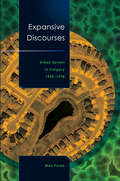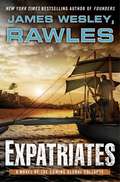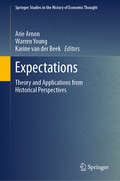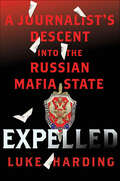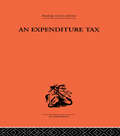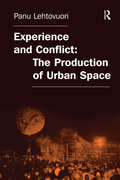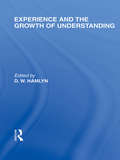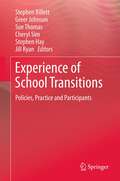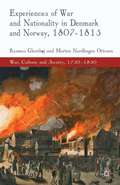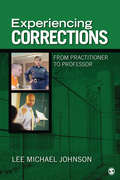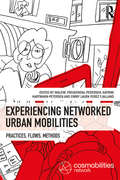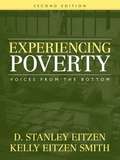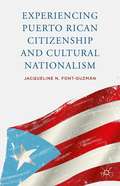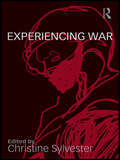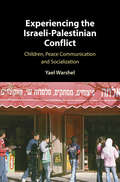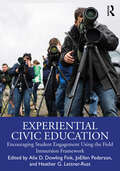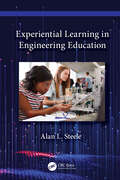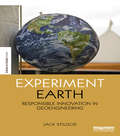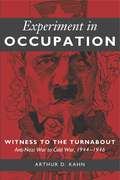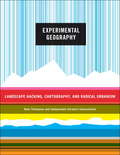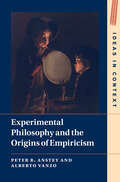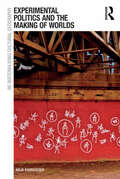- Table View
- List View
Expansive Discourses: Urban Sprawl in Calgary, 1945-1978
by Max ForanThis is a groundbreaking study of urban sprawl in Calgary after theSecond World War. The interactions of land developers and the localgovernment influenced how the pattern grew: developers met marketdemands and optimized profits by building houses as efficiently aspossible, while the city had to consider wider planning constraints andinfrastructure costs. Foran examines the complexity of theirinteractions from a historical perspective, why each party acted as itdid, and where each can be criticized.
Expatriates: A Novel of the Coming Global Collapse
by James Wesley RawlesIn the latest survivalist thriller from founder of survivalblog. com and New York Times bestselling author James Wesley, Rawles, two expat families struggle for their very survival in the midst of a global economic collapse. When the United States suffers a major socioeconomic collapse, a power vacuum sweeps the globe. A newly radicalized Islamic government rises to power in Indonesia, invades the Philippines, East Timor, Papua New Guinea, and finally northern Australia. No longer protected by American military interests, Australia must repel an invasion alone. In the thick of these political maneuvers, an American family of missionaries living in the Philippines and a Texan petroleum engineer in Australia must face the fear of being strangers in a world in flux. Are their relatives back home healthy and safe? Will they ever see them again? In its depiction of the authentic survivalist skills and techniques needed to survive a global socioeconomic meltdown, Expatriates is as informative as it is suspense-filled.
Expectations: Theory and Applications from Historical Perspectives (Springer Studies in the History of Economic Thought #Vol. 65)
by Arie Arnon Warren Young Karine van der BeekThis book provides a unique historical perspective on expectations in economic theory, and applications of expectations models in economic history. Based on papers presented at the 2017 Thomas Guggenheim Conference, it brings together the work of economists, historians of economics, and economic historians on issues and events concerning expectations in economics and economic history. The contributions address: (i) the history of expectations models; (ii) growth, expectations and political economy; (iii) controversies regarding expectations methods and models; (iv) expectations in theory and reality; and (v) expectations in economic history. The book opens with a lecture by Thomas Guggenheim Prize winner Duncan Foley on the evolution of expectations in modern economic thought. The remaining content is divided into two parts, the first of which focuses on the utilization of expectations in the “ancient” and “meso” periods of high theory, i.e., from Smithian to Keynesian approaches. The papers cover topics such as “modern” applications of expectations in both “Tobinesque-Phillips” and “Harrodian-Solowian” contexts, and the debate between Friedmanite and Keynesian approaches to expectation formation. In turn, the last part presents essays on the role of economic expectations in connection with historical events and contexts, ranging from the early 20th century to World War II, and on the application of expectations theory to hyperinflation and stabilization, taking Israel as a case study.
Expelled: A Journalist's Descent into the Russian Mafia State
by Luke HardingIn 2007 Luke Harding arrived in Moscow to take up a new job as a correspondent for the British newspaper, The Guardian. Within months, mysterious agents from Russia's Federal Security Service --the successor to the KGB--had broken into his apartment. He found himself tailed by men in leather jackets, bugged, and even summoned to the KGB's notorious prison, Lefortovo. The break-in was the beginning of an extraordinary psychological war against the journalist and his family. Windows left open in his children's bedroom, secret police agents tailing Harding on the street, and customs agents harassing the family as they left and entered the country became the norm. The campaign of persecution burst into the open in 2011 when the Kremlin expelled Harding from Moscow--the first western reporter to be deported from Russia since the days of the Cold War. Expelled is a brilliant and haunting account of the insidious methods used by a resurgent Kremlin against its so-called "enemies"--human rights workers, western diplomats, journalists and opposition activists. It includes illuminating diplomatic cables which describe Russia as a "virtual mafia state". Harding gives a personal and compelling portrait of Russia that--in its bid to remain a superpower--is descending into a corrupt police state.
Expelling Public Schools: How Antiracist Politics Enable School Privatization in Newark
by John ArenaExploring the role of identitarian politics in the privatization of Newark&’s public school system In Expelling Public Schools, John Arena explores the more than two-decade struggle to privatize public schools in Newark, New Jersey—a conflict that is raging in cities across the country—from the vantage point of elites advancing the pro-privatization agenda and their grassroots challengers.Analyzing the unsuccessful effort of Cory Booker—Newark&’s leading pro-privatization activist and mayor—to generate popular support for the agenda, and Booker&’s rival and ultimate successor Ras Baraka&’s eventual galvanization of the charter movement, Arena argues that Baraka&’s black radical politics cloaked a revanchist agenda of privatization.Expelling Public Schools reveals the political rise of Booker and Baraka, their one-time rivalry and subsequent alliance, and what this particular case study illuminates about contemporary post–civil rights Black politics. Ultimately, Expelling Public Schools is a critique of Black urban regime politics and the way in which antiracist messaging obscures real class divisions, interests, and ideological diversity.
Expenditure Tax (Modern Revivals In Economics Ser.)
by Nicholas Kaldor'This is one of those rare technical books which has an importance outside its own field' The Daily Telegraph.'One of the most stimulating post-war books on public finance' The Guardian.Part 1 examines the issue of Expenditure Tax in principle and includes chapters on the following:* Income, Expenditure and Taxable Capacity* The Concept of Income in Economic Theory* Taxation and Savings* Taxation and risk-bearing* Taxation and the Incentive to Work* Company Taxation* Taxation and Economic ProgressPart 2 examines the issue of Expenditure Tax in practice, asking whether personal expenditure tax is practicable and putting forward a proposal for Surtax Reform.
Experience and Conflict: The Dialectics Of The Production Of Public Urban Space In The Light Of New Event Venues In Helsinki 1993-2003
by Panu LehtovuoriWhen designing, planning and building urban spaces, many contradictory and conflicting actors, practices and agendas coexist. This book propounds that, at present, this process is conducted in an artificial reality, 'Concept City', characterized by a simplified and outdated conception of space. It provides a constructive critique of the concepts, underlying the practices of planning and architecture and, in order to facilitate more dynamic, inclusive and subtle practices, it formulates a new theory about space in general and public urban space in particular. The central notions in this theory are temporality, experiment and conflict, which are grounded on empirical observations in Helsinki, Manchester and Berlin. While the book contextualizes Lefebvre's ideas on urban planning and architecture, it is in no way limited to Lefebvrean discourse, but allows insights to new theoretical work, including that of Finnish and Swedish authors. In doing so, it suggests and develops exciting new approaches and tools leading to 'experiential urbanism'.
Experience and the growth of understanding (International Library of the Philosophy of Education Volume 11)
by D.W. HamlynThis volume examines some of the arguments that have been put forward over the years to explain the way in which understanding is acquired. The author looks firstly at the empricist thesis of genesis without structure, and secondly at the opposing theory, represented by Chomsky of structure without genesis. His greatest sympathy is with the theory of Piaget, who represents structure with genesis. He considers that Piaget's account is flawed, however, by its biological model and by its failure to deal adequately with the problem of objectivity. The second part of the book contains chapters on language, the differences between early and later learning, and on teaching. The book provides a general understanding of the principles that make it possible, and the differences between the ways in which they work at different stages.
Experience of School Transitions
by Sue Thomas Stephen Billett Cheryl Sim Greer Johnson Stephen Hay Jill RyanLeaving school, whether to move on to training, work or education, is a fundamental rite of passage the world over. This volume draws on a wealth of international sources and studies in its analysis of the 'transitions' young students make as they move on from their secondary schooling. It identifies how these transitions are planned for by policymakers, enacted by school staff and engaged with by students themselves. With data from a range of nations with advanced industrial economies, the book delineates how the policies relating to these transitions need to be conceived and implemented, how the transitions themselves are negotiated by young people, and how they might be shaped to meet the varied needs of the students they are designed to help. The authors argue that the relationship, often complex, between what schools provide in the way of preparation, and the ways in which students take up what is on offer, is the crucial nexus for understanding the experience of transitions by young people, and for enhancing that experience. With a host of case studies of transition policies themselves, as well as evaluative data on how they were received by the school leavers whom they were designed for, this valuable addition to the educational literature deserves to be read by all those with roles in preparing the young for their journey into a complex adult world full of pitfalls as well as opportunity.
Experience with Large Fiscal Adjustments (EPub)
by Mark A. Horton Mark J Flanagan Wojciech Maliszewski George C. TsibourisWhen policymakers have little option but to consider a sizable fiscal adjustment, they are confronted by the following questions: Can a large fiscal adjustment be implemented succesfully? How is a large adjustment best designed and implemented? What will be its impact on the economy? This Occasional Paper addresses these questions by describing the experience of countries that have undertaken large fiscal adjustments in the last three decades. It provides operational guidance to policymakers by identifying preconditions, common policy approaches, and institutional arrangements underlying successful and unsuccessful adjustment episodes.
Experiences of War and Nationality in Denmark and Norway, 1807–1815
by Rasmus Glenthøj Morten Nordhagen OttosenThis book explores the impact of the Napoleonic wars on Danish-Norwegian society and accounts for war experiences and the transformation of identities among the popular classes and educated élites alike.
Experiencing Corrections: From Practitioner to Professor
by Lee M. JohnsonWritten by scholars who have practical experience in corrections, the readable essays in this one-of-a-kind collection draw on real-world experiences to illustrate theoretical and methodological concepts and demonstrate approaches to corrections practice. Spanning the three general types of correctional environments—incarceration, community corrections, and juvenile corrections—the essays discuss working in prisons or prison systems, juvenile residential and community corrections, and probation and parole.
Experiencing Networked Urban Mobilities: Practices, Flows, Methods (Networked Urban Mobilities Series)
by Malene Freudendal-Pedersen Katrine Hartmann-Petersen Emmy Laura Perez FjallandExperiencing Networked Urban Mobilities looks at the different experiences of networked urban mobilities. While the focus in the first book is on conceptual and theory-driven perspective, this second volume emphasizes the empirical investigation of networked urban mobilities. This book is a resource for researchers interested in the field to gain easy access and overviews of different themes and approaches represented in the mobilities paradigm.
Experiencing Poverty: Voices From The Bottom
by D. Stanley Eitzen Kelly Eitzen SmithThis collection of readings provides the voice, the presence, and the perspective of the poor who live on the margins and are generally invisible to the middle and upper classes. The goals of this reader are twofold: (1) to bring the realities of the lives of the impoverished as close to the reader as possible (2) to get the reader to listen carefully to these voices of the poor in order to enhance their understanding of: a. How the poor became poor. b. How the poor are treated by individuals and organizations in the community. c. What keeps the poor poor. d. How the poor manage day-to-day. e. What theory of causation best explains poverty. f. The consequences of the welfare-to-work federal legislation. g. The best solutions for ending poverty.
Experiencing Puerto Rican Citizenship and Cultural Nationalism
by Jacqueline N. Font-GuzmánDrawing from in-depth interviews with a group of Puerto Ricans who requested a certificate of Puerto Rican citizenship, legal and historical documents, and official reports not publicly accessible, Jacqueline Font-Guzmán shares how some Puerto Ricans construct and experience their citizenship and national identity at the margins of the US nation. Winner of the 2015 Juridical Book of the Year in the category of ‘Essay Promoting Critical Thinking and Analysis of Juridical and Social Issues.’
Experiencing War (War, Politics and Experience)
by Christine SylvesterThis edited collection explores aspects of contemporary war that affect average people –physically, emotionally, and ethically through activities ranging from combat to television viewing. The aim of this work is to supplement the usual emphasis on strategic and national issues of war in the interest of theorizing aspects of war from the point of view of individual experience, be the individual a combatant, a casualty, a supporter, opponent, recorder, veteran, distant viewer, an international lawyer, an ethicist or other intellectual. This volume presents essays that push the boundaries of war studies and war thinking, without promoting one kind of theory or methodology for studying war as experiential politics, but with an eye to exploring the possibilities and encouraging others to take up the new agenda. It includes new and challenging thinking on humanitarianism and war, new wars in the Third World, gender and war thinking, and the sense of the body within war that inspires recent UN resolutions. It also gives examples that can change our understanding of who is located where doing what with respect to war –women warriors in Sierra Leone, war survivors living with their memories, and even an artist drawing something seemingly intangible about war –the arms trade. The unique aspect of this book is its purposive pulling together of foci and theoretical and methodological perspectives from a number of disciplines on a variety of contemporary wars. Arguably, war is an activity that engages the attention, the politics, and the lives of many people. To theorize it with those lives and perspectives in mind, recognizing the political contexts of war, is long overdue. This inter-disciplinary book will be of much interest to students of war studies, critical security studies, gender studies, sociology and IR in general.
Experiencing the Israeli-Palestinian Conflict: Children, Peace Communication and Socialization
by Yael WarshelOver the last eighty years there has been a global rise in 'peace communication' practice, the use of interpersonal and mass communication interventions to mediate between peoples engaged in political conflict. In this study, Yael Warshel analyses Israeli and Palestinian versions of Sesame Street which targeted negative inter-group attitudes and stereotypes. Merging communication, peace and conflict studies, social psychology, anthropology, political science, education, Middle Eastern and childhood studies, this book provides a template to think about how audiences receive, interpret, use and are influenced by peace communication. By picking apart the text and subtext of the kind of media these specific audiences of children consume, Warshel examines how they interpret 'peace communication' interventions, are socialised into Palestinians, Jewish Israelis and Arab/Palestinian Israelis, political opinions they express, and violence they reproduce. She questions whether peace communication practices have any relevant structural impact on their audiences, why such interventions fail, and offers recommendations for improving future communication interventions into political conflict worldwide.
Experiential Civic Education: Encouraging Student Engagement Using the Field Immersion Framework
by JoEllen Pederson Lettner-Rust, Heather G.Experiential Civic Education: Encouraging Student Engagement Using the Field Immersion Framework articulates a practical, flexible teaching-and-learning pedagogy that engages students and instructors in opportunities to successfully explore complex civic issues in the classroom. This volume marries place-based experiential learning with civic engagement to promote important transformative learning outcomes.The Field Immersion Framework (FIF) pedagogy prepares students and faculty with the tools to navigate participatory democracy in local, state, national, and global communities. The FIF uses four stages – Foregrounding, Immersion, Reflection, and Civic Agency – to position learners as explorers and researchers in communities grappling with important societal issues. In this volume, Foregrounding chapters prime the reader with the theoretical support to explore the content; Immersion chapters situate the reader in case studies of FIF courses; Reflection chapters showcase the voices of students, faculty members, student affairs professionals, and others who have participated in these courses; and, finally, Civic Agency chapters explore the implications of the FIF.This book will be important reading for those developing courses relating to civic engagement, social justice education, and community-based teaching and learning. It also supports educators in exploring place-based civic issues with their students, working to encourage understanding of diverse voices and perspectives, and supporting students’ lifelong navigation of our complex world.
Experiential Learning in Engineering Education
by Alan L. SteeleExperiential Learning presents an evolving form of education that fundamentally involves "learning by doing" and having students reflect on the work. The book discusses these recent developments pertaining to the use of experiential learning in engineering education. Covering a range of innovations in experiential learning, the book explores development in laboratories, in-class and problem-based learning, project work and society-based aspects, including Indigenous elements in the curriculum. It includes case studies and examples sourced from institutions around the world. Features Focuses on recent and practical aspects of implementing experiential learning to help improve engineering education Offers an examination of the undergraduate experience, which leads to professional certification Includes a chapter on lessons in other professional education areas, such as medicine and health care, business and social work A broad readership will find value in this book, including faculty who teach undergraduate engineering courses, engineering education researchers, industry partners that provide co-op experience and developers of training modules for practicing engineers.
Experiment Earth: Responsible innovation in geoengineering (The Earthscan Science in Society Series)
by Jack StilgoeExperiments in geoengineering – intentionally manipulating the Earth’s climate to reduce global warming – have become the focus of a vital debate about responsible science and innovation. Drawing on three years of sociological research working with scientists on one of the world’s first major geoengineering projects, this book examines the politics of experimentation. Geoengineering provides a test case for rethinking the responsibilities of scientists and asking how science can take better care of the futures that it helps bring about. This book gives students, researchers and the general reader interested in the place of science in contemporary society a compelling framework for future thinking and discussion.
Experiment in Occupation: Witness to the Turnabout: Anti-Nazi War to Cold War, 1944–1946
by Arthur D. KahnAs a participant in many of the events he writes about in Experiment in Occupation, Arthur Kahn offers a richly detailed account of the process by which the fight against Nazism came to be transformed into the Cold War. His story reveals how those in the Military Government of Germany who were dedicated to carrying out the war aims promulgated by Roosevelt and Eisenhower for a thorough democratization of Germany were ultimately defeated in their confrontation with powerful elements in the Military Government and in Washington who were more intent upon launching a preemptive war against the Soviet Union than upon the eradication of Nazism and German militarism. A twenty-three-year-old OSS operative, Arthur Kahn was assigned after D-Day to a psychological warfare unit, where at first he supervised prisoner-of-war interrogations and then served as an editor of intelligence. Instructed to respond to requests from Supreme Headquarters, he drafted proposals for psychological warfare approaches to critical situations at the front only to discover that a SHAEF directive banned calls to the Germans to revolt. Subsequently Kahn served in liaison with the Soviets and during the Battle of the Bulge at Montgomery's British headquarters. For several months before and after VE Day he traveled through the American Zone as an intelligence investigator and wrote a report that led to the dismissal of General George S. Patton as Military Governor of Bavaria. Appointed Chief Editor of Intelligence of the Information Control Division, he produced the most influential intelligence weekly in the American Zone. Kahn's portrayal of events in postwar Germany provides warnings for current and future American experiments in foreign occupation.
Experimental Geography
by Trevor Paglen Nato Thompson Independent Curators International Jeffrey KastnerA photo of a secret CIA prison. A map designed to help visitors reach Malibu's notoriously inaccessible public beaches. Guidebooks to factories, prisons, and power plants in upstate New York. An artificial reef fabricated from 500 tons of industrial waste. These are some of the more than one hundred projects represented in Experimental Geography, a groundbreakingcollection of visual research and mapmaking from the past ten years.Experimental Geography explores the distinctions between geographical study and artistic experience of the earth, as well as the juncture where the two realms collide (and possibly make a new field altogether). This lavishly illustrated book features more than a dozen maps; artwork by Francis Alÿs, Alex Villar, and Yin Xiuzhen; and recent projects by The Center for Land Use Interpretation, the Raqs Media Collective, and the Center for Urban Pedagogy. The collection is framed by essays by bestselling author Trevor Paglen, Jeffrey Kastner, and editor Nato Thompson.
Experimental Philosophy and the Origins of Empiricism (Ideas in Context #145)
by Alberto Vanzo Peter R. AnsteyThe emergence of experimental philosophy was one of the most significant developments in the early modern period. However, it is often overlooked in modern scholarship, despite being associated with leading figures such as Francis Bacon, Robert Boyle, Isaac Newton, Jean Le Rond d'Alembert, David Hume and Christian Wolff. Ranging from the early Royal Society of London in the seventeenth century to the uptake of experimental philosophy in Paris and Berlin in the eighteenth, this book provides new terms of reference for understanding early modern philosophy and science, and its eventual eclipse in the shadow of post-Kantian notions of empiricism and rationalism. Experimental Philosophy and the Origins of Empiricism is an integrated history of early modern experimental philosophy which challenges the rationalism and empiricism historiography that has dominated Anglophone history of philosophy for more than a century.
Experimental Political Science
by Bernhard Kittel Wolfgang J. Luhan Rebecca B. MortonAn exploration of core problems in experimental research on voting behaviour and political institutions, ranging from design and data analysis to inferences with respect to constructs, constituencies and causal claims. The focus of is on the implementation of principles in experimental political science and the reflection of actual practices.
Experimental Politics and the Making of Worlds
by Anja KanngieserCreative strategies have been central to global social movements. From the theatrics of the 1999 Seattle protests, to the rebel clowns at the 2005 G8 summit in Gleneagles and the antics of the Yes Men, the crossovers between art and politics have increasingly become more visible and prolific. This book explores an innovative form of creative and communicative politics: the ’performative encounter’, as a strategy for facilitating new ways of being, relating and making worlds. Unlike existing scholarship that frames such encounters in artistic or cultural terms, this book analyzes performative encounters through an organizational lens to accentuate their social-political potential, engaging a wealth of material from autonomist philosophy, political science, performance studies, geography and social movement texts. Intertwining conceptual and ethnographic research, it uniquely maps out one narrative of the encounter, tracing a line through the twentieth century from the Berlin Dadaists, to the Situationist International, to several contemporary German collectives and campaigns, showing how performative encounters intervene in global and local issues such as the privatization of public space and resources, human mobility and the corporatization of education.
